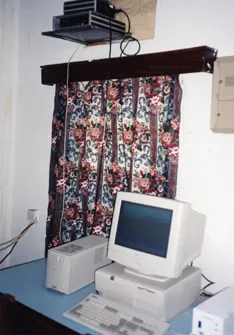Andrew Gettelman - Atmospheric Chemist
Combining chemistry and climate

Andrew Gettelman
Photo by Carlye Calvin, UCAR
Andrew Gettelman has a broad perspective on what he does as a scientist. "My job is to try to figure out how the world works," he says. "There's a lot of fun in that, as well as infinite job security, since we'll never completely figure it out."
A joint appointment between two divisions in the NCAR Earth System Laboratory allows Andrew to combine climate models with atmospheric chemistry models to study how the two areas interact. "When I talk to climate modelers, I'm a chemist, and when I talk to chemists, I'm a climate modeler," he jokes, adding that there isn't a hard division between the two areas. "There are groups at NCAR that do both, and when they communicate, I'm in the middle of it."
Andrew's broad goal is to try to simulate the future evolution of the atmosphere in terms of climate and chemistry. Much of his work relates to the ozone layer and climate change. The chemistry of the ozone layer is important because it affects weather and climate, whereas changes in climate in turn affect chemistry. And because the greenhouse gases responsible for global warming are themselves chemicals, understanding their chemistry and what controls their reactions is important for simulating future climate.
"People have been trying to predict climate for a long time," Andrew says. "But we're only now starting to try to predict the future chemistry of the atmosphere," Andrew says.
The most challenging aspect of his job is trying to understand aspects of the atmosphere that are yet uncertain. "It's like looking through a keyhole or fuzzy glass at data and models to try to interpret how Earth works," he says. "I use both observations and models because observations from aircraft and satellites give you a small picture of what's happening, but if you can simulate specific observations with a model, that means you actually understand why things are happening."
Andrew grew up in Los Angeles. As a child he liked to tinker with things and had a natural tendency toward science and engineering. He started college at Princeton University as a mechanical and aerospace engineering major but later changed his mind. "In the late 1980s, when the Cold War was still around, mechanical and aerospace engineers basically built weapons," he explains. "I discovered my first year in college that I didn't want to do that."
He switched to civil engineering and architecture instead, a move that exposed him to environmental engineering because that subject was part of the same department. After graduation, he got an internship working on climate change policy at the Natural Resources Defense Council in Washington, D.C. "I learned an incredible amount, mostly about how politics works," he recalls.

The primary satellite system for the entire country of Uganda is this work station at the National Meteorological Training Center, in Entebbe. The system is the only means for receiving data for adjacent countries (such as the Congo) that have no surface stations.
Photo by Andrew Gettelman, NCAR
Andrew realized that he needed to make a choice between different career paths. "I decided I wanted to learn more about science," he says. "If I wanted to go back into policy, I could do that again. As a scientist, you can always figure out a way to do more policy work. But it would have been more difficult to get back into science."
His next step was to the University of Washington, where he earned a doctorate in atmospheric sciences and a certificate in environmental management. He came to NCAR as a postdoctoral fellow shortly after to research the transport of chemicals between the upper and lower atmosphere, and how this affects the ozone hole, climate, and air pollution.
After his fellowship, Andrew took time off from research to pursue his interest in policy by traveling around the developing world to survey climate scientists about their ability to access electronic information and how this affects their work. As he points out, the UCAR Web site has data portals accessible to people anywhere on the planet--assuming they have reliable Internet connections and electrical power.
"I've always been interested in traveling to see different perspectives that people have, and the different circumstances under which they live and work," he says. "The information divide mirrors the increasing digital divide between wealthy and poor countries."
With support from NCAR, Andrew published a report, The Information Divide in the Climate Sciences, on his findings, as well as an essay in the Bulletin of the American Meteorological Society.
After his travels, he returned to NCAR to continue his research. He says that although he is deeply interested in both policy and teaching, he plans to stay in research for quite a while. "I don't know where that research will take me, but that's the fun of it," he says.
Andrew appreciates that, as a research scientist, he gets to set his own course, work on different projects, and switch topics frequently. "I view science as a creative profession," he says. "Nobody tells me what to do in the morning so I'm very self-directed. The independence is good, but it can be a challenge."
To stay motivated, he notes the small steps over the years that eventually lead to significant results. "Every answer comes up with another question."
by Nicole Gordon
October 2005; February 2011